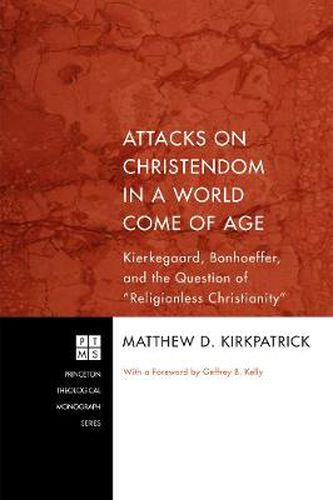Readings Newsletter
Become a Readings Member to make your shopping experience even easier.
Sign in or sign up for free!
You’re not far away from qualifying for FREE standard shipping within Australia
You’ve qualified for FREE standard shipping within Australia
The cart is loading…






This title is printed to order. This book may have been self-published. If so, we cannot guarantee the quality of the content. In the main most books will have gone through the editing process however some may not. We therefore suggest that you be aware of this before ordering this book. If in doubt check either the author or publisher’s details as we are unable to accept any returns unless they are faulty. Please contact us if you have any questions.
Though Soren Kierkegaard and Dietrich Bonhoeffer both made considerable contributions to twentieth-century thought, they are rarely considered together. Against Kierkegaard’s melancholic individual, Bonhoeffer stands as the champion of the church and community. In Attacks on Christendom, Matthew D. Kirkpatrick challenges these stereotypical readings of these two vital thinkers. Through an analysis of such concepts as epistemology, ethics, Christology, and ecclesiology, Kirkpatrick reveals Kierkegaard’s significant influence on Bonhoeffer throughout his work. Kirkpatrick shows that Kierkegaard underlies not only Bonhoeffer’s spirituality but also his concepts of knowledge, being, and community. So important is this relationship that it was through Kierkegaard’s powerful representation of Abraham and Isaac that Bonhoeffer came to adhere to an ethic that led to his involvement in the assassination attempts against Hitler. However, this relationship is by no means one-sided. Attacks on Christendom argues for the importance of Bonhoeffer as an interpreter of Kierkegaard, drawing Kierkegaard’s thought into his own unique context, forcing Kierkegaard to answer very different questions. Bonhoeffer helps in converting the obscure, obdurate Dane into a thinker for his own, unique age. Both Kierkegaard and Bonhoeffer have been criticized and misunderstood for their final works that lay bare the religious climates of their nations. In the final analysis, Attacks on Christendom argues that these works are not unfortunate endings to their careers, but rather their fulfilment, drawing together the themes that had been brewing throughout their work.
$9.00 standard shipping within Australia
FREE standard shipping within Australia for orders over $100.00
Express & International shipping calculated at checkout
This title is printed to order. This book may have been self-published. If so, we cannot guarantee the quality of the content. In the main most books will have gone through the editing process however some may not. We therefore suggest that you be aware of this before ordering this book. If in doubt check either the author or publisher’s details as we are unable to accept any returns unless they are faulty. Please contact us if you have any questions.
Though Soren Kierkegaard and Dietrich Bonhoeffer both made considerable contributions to twentieth-century thought, they are rarely considered together. Against Kierkegaard’s melancholic individual, Bonhoeffer stands as the champion of the church and community. In Attacks on Christendom, Matthew D. Kirkpatrick challenges these stereotypical readings of these two vital thinkers. Through an analysis of such concepts as epistemology, ethics, Christology, and ecclesiology, Kirkpatrick reveals Kierkegaard’s significant influence on Bonhoeffer throughout his work. Kirkpatrick shows that Kierkegaard underlies not only Bonhoeffer’s spirituality but also his concepts of knowledge, being, and community. So important is this relationship that it was through Kierkegaard’s powerful representation of Abraham and Isaac that Bonhoeffer came to adhere to an ethic that led to his involvement in the assassination attempts against Hitler. However, this relationship is by no means one-sided. Attacks on Christendom argues for the importance of Bonhoeffer as an interpreter of Kierkegaard, drawing Kierkegaard’s thought into his own unique context, forcing Kierkegaard to answer very different questions. Bonhoeffer helps in converting the obscure, obdurate Dane into a thinker for his own, unique age. Both Kierkegaard and Bonhoeffer have been criticized and misunderstood for their final works that lay bare the religious climates of their nations. In the final analysis, Attacks on Christendom argues that these works are not unfortunate endings to their careers, but rather their fulfilment, drawing together the themes that had been brewing throughout their work.